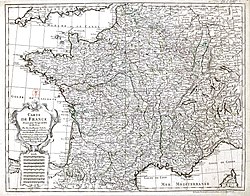France in the early modern period
| History of France |
|---|
 |
| Timeline |
| Topics |
|
|
 |
| Ancien Régime |
|---|
| Structure |
- "'Ancien Régime" means "Old Rule" or "Old Order" in French and refers primarily to the social and political system slowly established in France under the Valois and the Wars of Religion and which came to fruition under the Bourbon dynasties. For more on the expression, see Ancien Régime.
France under the Ancien Régime -- the socio-political system which developed throughout the rule of the Valois and Bourbon dynasties -- was a nation half-way between feudalism and modernity, ruled over by a powerful absolute monarchy which relied on the doctrine of the Divine Right of Kings and the explicit support of the established Church.
This period in the history of France is often said to have begun with the French Renaissance during the reign of Francis I (r. 1515-1547), and to have reached its peak under Louis XIV (r. 1643-1715). As the Italian Renaissance began to fade, due in part to the French invasion of Italy, France became the cultural capital of Europe. Straddling both the Mediterranean and Atlantic worlds, France could still rely on traditional trade routes from Italy and the Orient and also benefit from the new and lucrative trade and colonization of the Americas. Eventually, however, financial difficulties and royal excesses led to the decline and eventual collapse of the monarchy near the end of the eighteenth century.
The political structures of the Ancien Régime were the result of centuries of nation-building, internal conflicts and civil wars. Much of the political centralization of France had been lost in the Hundred Years War and the Valois Dynasty's attempts at re-establishing control over the scattered political centers of the country were hindered by the Wars of Religion. Much of the reigns of Henri IV, Louis XIII and the early years of Louis XIV were shaped by powerful internal conflicts which protested against this centralization.
Key to this centralization was the substitution of personal "clientel" systems organized around the king and other great lords into institutional systems around the state. The creation of the Intendants -- representatives of royal power in the provinces -- would do much to undermine local control by regional nobles; that same was true with the greater reliance by the court on the "noblesse de robe" as judges and royal counselors. The creation of regional parlements had initially the same goal of facilitating the introduction of royal power into newly assimilated territories, but as the parlements gained in self-assurance, they began to be sources of disunity.
Historical overview
France's pacification under Henri IV laid much of the ground for the beginnings of France's rise to European hegemony, although at his death in 1610, the Regency of his wife Marie de Medici suffered from internal conflicts with the noble families.
Henri IV's son Louis XIII and his minister (1624-1642) Cardinal Richelieu, elaborated a policy against Spain and the German emperor during the Thirty Years' War (1618-1648) which had broken out among the lands of Germany's Holy Roman Empire. An English-backed Huguenot rebellion (1625-1628) defeated, France intervened directly (1635) in the wider European conflict following her ally (Protestant) Sweden's failure to build upon initial success.
After the death of both king and cardinal, the Peace of Westphalia (1648) secured universal acceptance of Germany's political and religious fragmentation, but the Regency of Anne of Austria and her minister Cardinal Mazarin experienced a civil uprising known as the Fronde (1648-1653) which expanded into a Franco-Spanish War (1653-1659). The Treaty of the Pyrenees (1659) formalised France's seizure (1642) of the Spanish territory of Roussillon after the crushing of the ephemeral Catalan Republic and ushered a short period of peace.
During the reign of Louis XIV (1643-1715), France was the dominant power in Europe, aided by the diplomacy of Richelieu's successor (1642-1661) Cardinal Mazarin and the economic policies (1661-1683) of Colbert. Renewed war (1667-1668 and 1672-1678) brought further territorial gains (Artois and western Flanders and the free county of Burgundy, left to the Empire in 1482), but at the cost of the increasingly concerted opposition of rival powers.
Following the seizure of the (then separate) English, Irish and Scottish thrones by the Dutch prince William of Orange in 1688, the anti-French "Grand Alliance" of 1689 inaugurated more than a century of intermittent European conflict in which Britain would play an ever more important role, seeking in particular to keep France out of the Netherlands (the Dutch provinces and the future Belgium, then under Spanish rule).
After the war of 1689-1697 gained France only Haiti (lost to a slave revolt a century later), the War of the Spanish Succession (1701-1713) ended with the undoing of Louis's dreams of a Franco-Spanish Bourbon empire: the two conflicts strained French resources already weakened by disastrous harvests in the 1690s and in 1709, as well as by the revocation (1685) of the Edict of Nantes and the consequent loss of Huguenot support and manpower.
The reign (1715-1774) of Louis XV saw an initial return to peace and prosperity under the regency (1715-1723) of Philippe II, duke of Orléans, whose policies were largely continued (1726-1743) by Cardinal Fleury, prime minister in all but name, renewed war with the Empire (1733-1735 and 1740-1748) being fought largely in the East. But alliance with the traditional Habsburg enemy (the "Diplomatic Revolution" of 1756) against the rising power of Britain and Prussia led to costly failure in the Seven Years' War (1756-1763).
On the eve of the French Revolution of 1789, France was a predominantly rural country ruled by an absolute monarch and the aristocracy under the now-called ancien régime, very backwards in many ways (for instance, torture was considered an appropriate means of extracting confessions in criminal trials; there was no freedom of religion, except that Protestantism was tolerated...). The ideas of the Enlightenment had however begun to permeate the educated classes of society.
